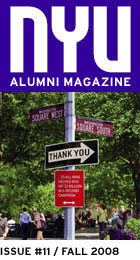scholarship
So Long, Printed Word?
NYU libraries evolve with the new millennium
by Amy Rosenberg
When the 15th–century German goldsmith Johannes Gutenberg expanded upon ancient Chinese woodblock and typing techniques to create a printing press with movable type, he forever changed the relationship between scholars and the written word. Now nearly 600 years later, a new revolution is under way. Electronic book devices such as Amazon.com’s Kindle and Sony’s Portable Reader have yet to replace the good old codex altogether, but many cultural critics believe that they will soon.

For research institutions, the implications are profound: With the increasing digitization of old–fashioned books and the production of new books exclusively in electronic form, scholars can access information without ever leaving their living room. Libraries, therefore, now must reimagine their role to meet the changing needs of patrons.
To help envision and refine these needs, the NYU Division of Libraries has formed an alliance with the self–styled “think–and–do tank,” the Institute for the Future of the Book, or IFB. Established in 2004, IFB studies the widespread shift in communication, and produces new ideas and tools to help engineer it. Together, NYU and IFB will use a National Endowment for the Humanities start–up grant to develop enhancements to MediaCommons, an electronic scholarly publishing network in media studies that includes multimedia content as well as links to other articles and tools for adding public comments. They will also investigate new technologies for research, collaboration, and publication. “The library has to become an organization engaged with the transformation,” says NYU’s dean of libraries Carol A. Mandel.
Some of the changes that students and professors can expect in coming years, Mandel says, include the movement of more physical books off–site, a reconfigured library with spaces available for more styles of research and collaboration, and a new emphasis on dissemination that will assist educators with all aspects of scholarly communication. But, Mandel notes, certain fundamental functions will not change. “It’s always been the library’s role to help scholars discover and use information,” she says. “We will continue to do that. And we will still have books on the premises—at least for now.”
As with any revolution, not everyone is comfortable with the changes taking place. Hasia Diner, professor of Hebrew and Judaic studies, worries about what will happen to the quality of research when fewer books are available and the only way to engage with texts is online. “Thousands of times I’ve gone up to the stacks to look for one thing, and immediately I’ve been drawn to the book next to it,” she says. “That book often turns out to be extremely valuable in my research. You can’t find everything you need through keyword searches. Sometimes you need the slowness of physical browsing, and you need to confront a text in its entirety.”
Despite the move to digital, Mandel insists that libraries are in no danger of becoming irrelevant. On the contrary, she says, they are becoming more useful and their roles more multi–faceted. With fewer circulation and cataloging duties, librarians are freer to help with research and technological guidance. “In a sense, the Internet is the world’s biggest library,” IFB director Bob Stein agrees. “But it’s a disorganized one, and we need new generations of libraries and publishing to sort through and use information.”
Illustration © opto design







